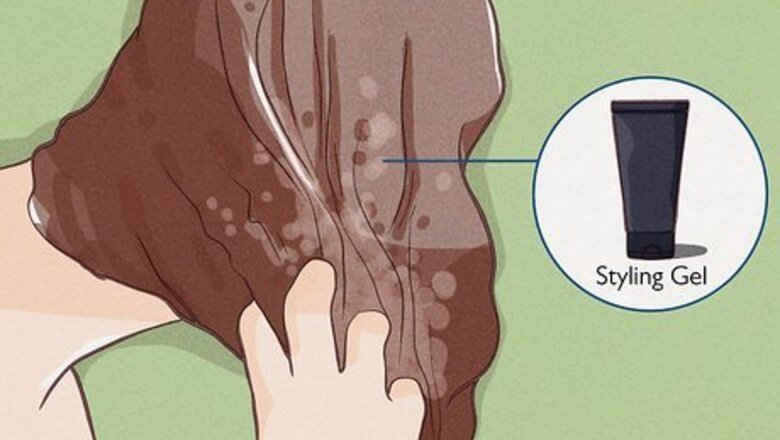
views
- Gel your hair to keep it neat under the cap, then pin it up with a braid, bun, or cornrows.
- Spray scalp protector onto your head to protect your skin under the cap.
- Align the front of the cap with your forehead's hair line, then pull the cap backward over your head.[1]
- Tuck any stray hairs into the cap, and tuck the sides of your hair behind your ears. Secure the cap all around with bobby pins.
Putting Your Hair Up
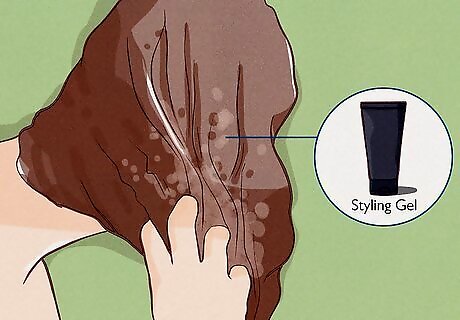
Apply gel to your hair to make it easier to tuck under the cap. This is especially helpful if you have short hair or a lot of small baby hairs. Run a palm-sized amount of hair gel through your hair, using a comb or your fingers to pull the product down your strands. Once your hair is coated, you can braid it or twist it onto the top of your head and pin it into place. Apply more gel to areas that tend to have more flyaways, like around your hairline or the nape of your neck. If you don’t have gel, you can simply wet your hair to slick it down. Make sure you wring out the strands so that it’s damp, not dripping.
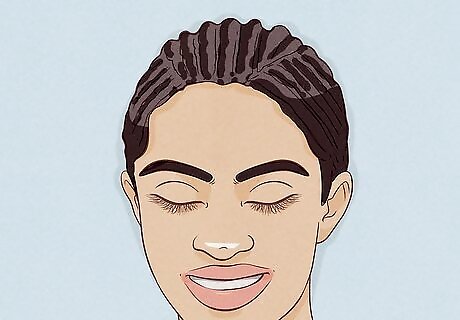
Wear your hair in cornrows if you don’t want it to be visible under the wig. Cornrows are incredibly tight braids that lay flat against your scalp. Part your hair in even rows from the front of your head to the back. The more sections you make, the smaller your braids will be and the flatter they’ll be against your head. Then braid down each row, picking up hair from the section as you go so that the braid attaches to the scalp. Use small rubber bands or barrettes to hold the braids in place. If you have trouble sectioning off the hair or if you have natural hair, spritz detangling spray on your strands as you go. This makes it easier to braid. You can also go to a hair salon to have a professional stylist put in cornrows.
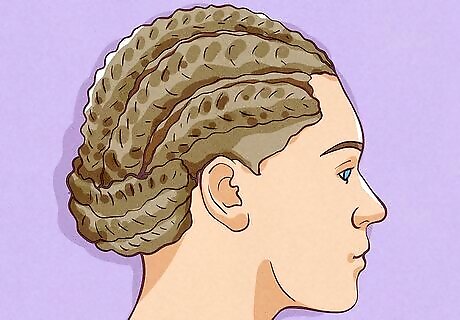
Wrap 2 braids around your head if you have long hair. Part your hair down the middle and braid each side separately. Secure each braid with a hair tie, then criss cross them against the back of your head. Pull the tails up behind your ears and use bobby pins to secure the braids in place on top of your scalp. For hair that’s extra thick, you can split your hair into more sections before braiding it. For example, if you make 4 braids, they’ll lay flatter against your head. You can also try a different type of braid, like a French braid.
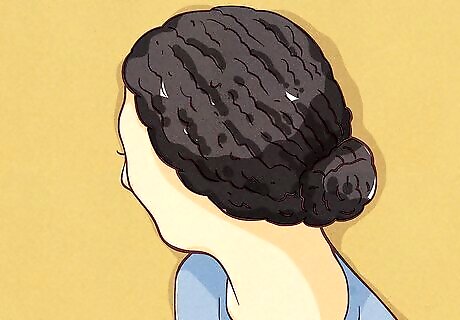
Make a bun at the nape of your neck if you have thin hair. This will only work if your hair is fine or if you have hair that's shoulder-length or shorter. Otherwise, the bun will stick out too much. Pull all of your hair to the back in a low, tight bun and secure it at the base of your head with pins. You can also make 2 smaller buns to help them lay flatter. If you have shorter hair that slips out of the bun, spritz the strands with hairspray to hold them in place.
Placing a Wig Cap Over Your Hair
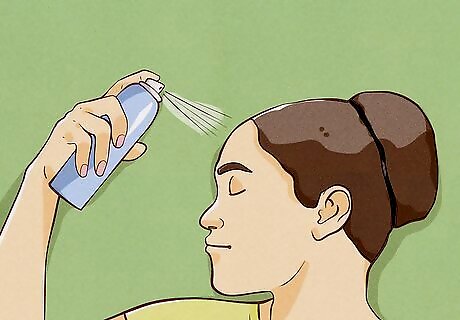
Spray scalp protector onto your head if you have sensitive skin. While wig caps protect your scalp from the wig itself, the caps can still be itchy. To prevent any irritation, spritz scalp protector all over your head and let it dry completely before putting on your wig cap. You can buy scalp protector from a beauty supply store or online retailer. It should take the spray about 20 to 30 minutes to dry.
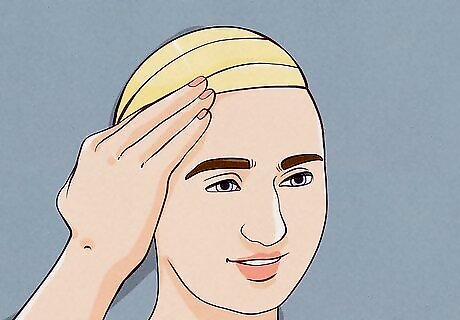
Align the wig cap with your natural hairline on the front of your head. This will make sure all of your natural hair is completely covered by the cap and eventually the wig. Position the edge of the cap so it sits exactly on your hairline on your forehead. It shouldn’t be in front of or behind your hairline. You can buy wig caps from a costume store, a beauty supply store, or an online retailer. Wig caps come in nude or black. Choose one that matches your hair or skin tone. For example, if you have fairer skin or hair, pick a nude cap. If you have an uneven hairline, like if you have a widow’s peak, place the edge of the wig cap along the lowest part of your hairline so that none of your hair is showing.For wig caps with a lace closure in the front, line up the front of the cap about ⁄2 inch (1.3 cm) back from your hairline. This will prevent the cap from being visible when you put on the wig.
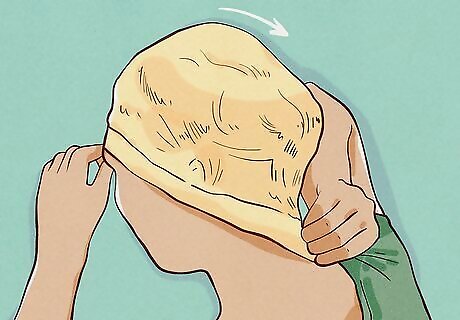
Pull the wig cap over the back of your head to the nape of your neck. Once your cap is lined up properly in the front, stretch it snugly over your hair. Continue pulling it down until the bottom of the cap hits right where the base of your head and the top of your neck meet. It helps to use 1 hand to hold the front of the wig cap in place on your hairline while you use your other hand to stretch the cap down.
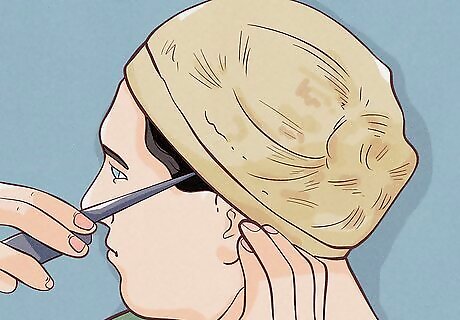
Tuck the sides of the cap behind your ears. When you stretch the cap over your head, it will be covering your ears, too. Adjust the wig cap so that your ears are exposed by pushing the sides up so it rests behind your ears instead of over top of them. If any strands escape from the sides while you do this, tuck the hair back under the cap once it’s in place around your ears.
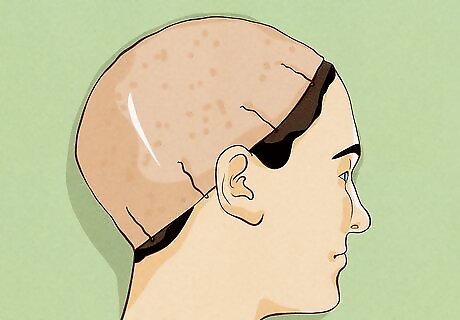
Insert bobby pins around the edges to hold the wig cap in place. To keep the wig cap from sliding off or slipping, push bobby pins under the edges of the cap, securing it to your hair. Place as many pins on the cap as you’d like, using at least 1 to 2 pins on both the front and back of your head. You can also use snap clips instead of bobby pins. If you have thicker hair, you’ll need more pins than someone with thin hair. All you have to do now is put your wig on top of your wig cap—then, you'll be good to go!
















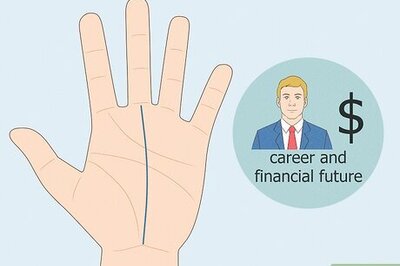



Comments
0 comment